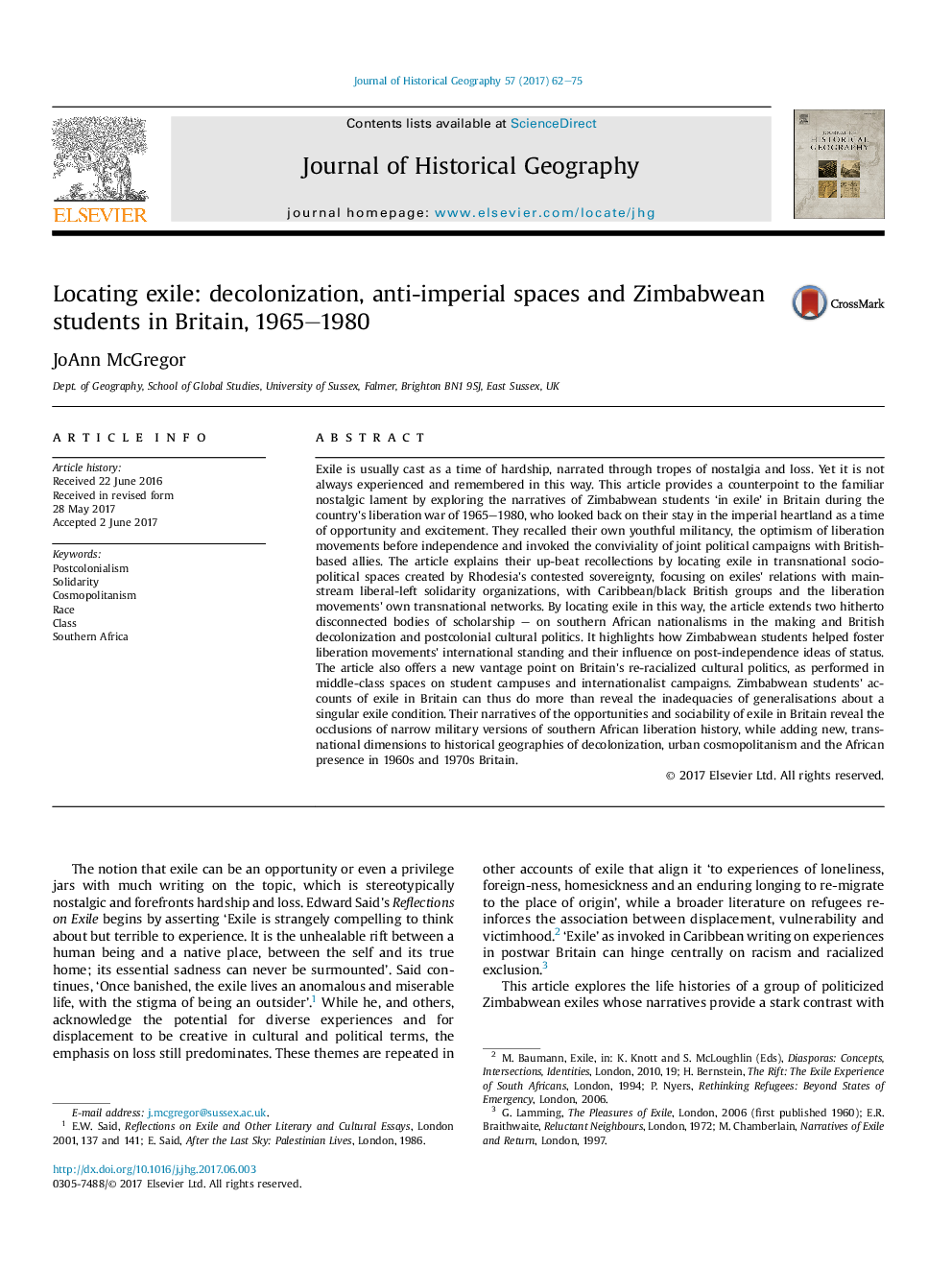| کد مقاله | کد نشریه | سال انتشار | مقاله انگلیسی | نسخه تمام متن |
|---|---|---|---|---|
| 5112833 | 1645228 | 2017 | 14 صفحه PDF | دانلود رایگان |
عنوان انگلیسی مقاله ISI
Locating exile: decolonization, anti-imperial spaces and Zimbabwean students in Britain, 1965-1980
ترجمه فارسی عنوان
محل تبعید: تقسیم بندی، فضاهای ضد امپریالیست و دانشجویان زیمبابوه در بریتانیا، 1965-1980
دانلود مقاله + سفارش ترجمه
دانلود مقاله ISI انگلیسی
رایگان برای ایرانیان
کلمات کلیدی
ترجمه چکیده
تبعید معمولا به عنوان یک زمان سختی روبرو می شود، که از طریق نوستالژی و از دست دادن روایت می شود. با این حال همیشه این تجربه و به یاد نمیآید. این مقاله با اشاره به داستان های دانشجویان زیمبابوه در تبعید در بریتانیا در طول جنگ آزاد سازی در سال های 1965 تا 1980 که به دنبال اقامت در قلمرو قلب امپراتوری به عنوان فرصت فرصت و هیجان . آنها جوانان ستیزه جویی خود را، خوش بینی از جنبش های آزادی قبل از استقلال به یاد می آوردند و به پیروی از مبارزات سیاسی مشترک با متحدان بریتانیایی پرداختند. این مقاله خاطرات قدردانی خود را با قرار دادن تبعید در فضاهای اجتماعی و فرهنگی فراملی که توسط حاکمیت متضاد رودزیا ایجاد شده است، با تمرکز بر روابط تبعید با سازمان های همبستگی چپ لیبرال چپ با گروه های کارائیب / سیاه انگلیس و شبکه های فراملیتی خود از جنبش های رهایی . با قرار دادن این تبعید در این مقاله، دو ماده متشکل از دانشجویان متشکل از متخاصم - در ملیگرایی آفریقایی جنوبی در ساخت و تقسیم بندی بریتانیا و سیاست فرهنگی پسا کولونیایی گسترش می یابد. این نشان می دهد که چگونه دانش آموزان زیمبابوه به ایجاد جایگاه بین المللی جنبش های آزادی و نفوذ آنها در ایده های پس از استقلال وضعیت کمک کردند. این مقاله همچنین نقطه جدیدی در مورد سیاست فرهنگی مجدد بریتانیا است که در فضاهای متوسط در دانشگاه های دانشجویی و کمپین های بین المللی انجام می شود. بنابراین حساب های دانشجویان زیمبابوه تبعید در بریتانیا می تواند بیشتر از ناکافی بودن تعمیم ها در مورد یک وضعیت تبعیدی منفرد انجام دهد. روایت آنها از فرصت ها و اجتماعی بودن تبعید در بریتانیا، نشانگر انحراف از نسخه های نظامی محدودی از تاریخ آزادی آفریقای جنوبی است، در حالی که با اضافه کردن ابعاد جدید و فرامنطقه ای به جغرافیای تاریخی تقسیم بندی، شهروندی شهری شهری و حضور افریقا در دهه 1960 و 1970، بریتانیا.
موضوعات مرتبط
علوم انسانی و اجتماعی
علوم انسانی و هنر
تاریخ
چکیده انگلیسی
Exile is usually cast as a time of hardship, narrated through tropes of nostalgia and loss. Yet it is not always experienced and remembered in this way. This article provides a counterpoint to the familiar nostalgic lament by exploring the narratives of Zimbabwean students 'in exile' in Britain during the country's liberation war of 1965-1980, who looked back on their stay in the imperial heartland as a time of opportunity and excitement. They recalled their own youthful militancy, the optimism of liberation movements before independence and invoked the conviviality of joint political campaigns with British-based allies. The article explains their up-beat recollections by locating exile in transnational socio-political spaces created by Rhodesia's contested sovereignty, focusing on exiles' relations with mainstream liberal-left solidarity organizations, with Caribbean/black British groups and the liberation movements' own transnational networks. By locating exile in this way, the article extends two hitherto disconnected bodies of scholarship - on southern African nationalisms in the making and British decolonization and postcolonial cultural politics. It highlights how Zimbabwean students helped foster liberation movements' international standing and their influence on post-independence ideas of status. The article also offers a new vantage point on Britain's re-racialized cultural politics, as performed in middle-class spaces on student campuses and internationalist campaigns. Zimbabwean students' accounts of exile in Britain can thus do more than reveal the inadequacies of generalisations about a singular exile condition. Their narratives of the opportunities and sociability of exile in Britain reveal the occlusions of narrow military versions of southern African liberation history, while adding new, transnational dimensions to historical geographies of decolonization, urban cosmopolitanism and the African presence in 1960s and 1970s Britain.
ناشر
Database: Elsevier - ScienceDirect (ساینس دایرکت)
Journal: Journal of Historical Geography - Volume 57, July 2017, Pages 62-75
Journal: Journal of Historical Geography - Volume 57, July 2017, Pages 62-75
نویسندگان
JoAnn McGregor,
